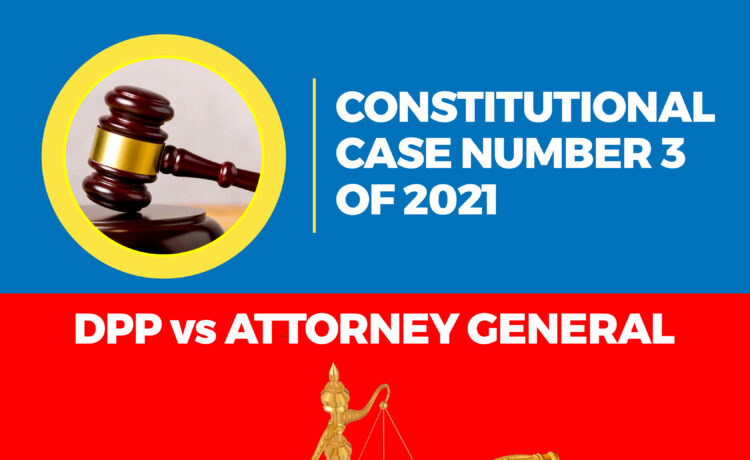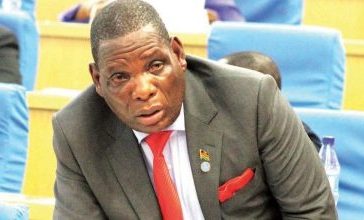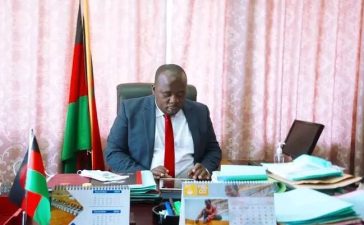The case at hand is the Constitutional Case Number 3 of 2021 between the DPP (the Claimant) and the Attorney General (the Defendant).
Today, the 22nd September 2021, the DPP deposited an Application with the Court praying that the Court should dismiss preliminary issues that the Defendant has raised. According to DPP, these Preliminary Issues should be disposed of without hearing on the grounds informing the preliminary issues. DPP has argued that the grounds that have been raised in the preliminary issues are equal to grounds raised in the substantive matters.
The Preliminary Issues
According to the Court records, as appreciated during the Scheduling Conference last week, the Defence has raised the following Preliminary Issues that are on points of law:
⚫ Whether the High Court has jurisdiction to overturn its own decision or to review its own decision;
⚫ Whether a High Court judgment can constitute a cause of action;
⚫ Whether the issues raised by the Claimant regarding the High Court judgment are justiciable;
⚫ Whether the present proceeding is aimed at reviewing or appealing against the decision of the High Court on similar issues;
⚫ Whether non-compliance with section 4 of the Civil Procedure (Suits by or Against Government or Public Officers) Act is fatal to the proceedings commenced against the Attorney General and whether the present proceedings can be dismissed for failing to comply with section 4 of the Civil Procedure (Suits by or Against Government or Public Officers) Act;
⚫ Whether the Claimant having deliberately contravened the law in recommending the appointment into the Electoral Commission, more than three nominees, the Claimant should be allowed to benefit from its own illegality and whether it should be estopped from challenging the decisions of the members of the Electoral Commission who were appointed into the Electoral Commission in contravention of section 4 the Electoral Commission Act;
⚫ Alternatively, whether the present proceeding seeks to benefit the Claimant from its own unlawful and illegal act;
⚫ Whether a political party has locus standi to challenge the results of an election and whether the Claimant and the Defendants are proper parties to the present proceeding;
⚫ Whether the present proceedings should have been commenced by way of petition and whether the present proceeding has been wrongly commenced;
⚫ Whether or not the present proceeding is statute barred under section 100 of the Parliamentary and Presidential Elections Act having been commenced more than seven days from the declaration of the result of the election;
⚫ Whether or not, the present proceeding is frivolous, vexatious and abuse of court process and a waste of the Court’s time.
My Discussion
The impact of these preliminary issues, if argued and adjudicated upon, is, in my estimation, generally fatal to the DPP’s case. These preliminary issues are, serve for the remainder of any issue(s) that may not be dealt with on the preliminaries, capable of turning the Claimant’s case a dead one on its arrival. It is, without doubt, this scary fate that the Claimant is attempting to avert by arguing that these points of law ought to be produced in arguments relating to substantive matters to be heard. The Claimant is scared of being dealt a knockout blow before the battle begins.
My opinion finds this argument by the Claimant to be surely laughable, dull and anaemic. To begin with, these preliminary issues are raising very significant and crucial issues that have to be dealt with before hearing of the substantive matters of the Application can gain a judicial hearing platform. The question of the Court’s jurisdiction, for example, is very key as the Court has to satisfy itself of its jurisdiction before hearing the matter. How, then, can the Court resolve such an issue when raised by a party without hearing the arguments? That is purely impossible.
Further, the Claimant’s belief that preliminary issues cannot contain points of law that are raised in the substantive matter is strange, bizarre (and yet again laughable). Preliminary issues, and this is something that the Claimant is at least expected to know, are not plucked from the air. They originate from pleadings of either or both parties. A general characteristic of pleadings is that they contain both points of facts and law (either at once or in turns) which act as limbs for their standing as issues. There is no rule that shields the points of law, so engraved in the pleadings, from being explored in generating preliminary issues. The argument, as shared by the Claimant, is laced with objections not known to the law. It is strange. That is why I am of the opinion that the Claimant’s prayer on this basis is peculiar, lame, alien and runs averse to the known process.
The rule of thumb, which I believe the Claimant knows, or at least ought to know, is that if the preliminary issue is an issue of law and it can be determined on agreed facts, the Courts are quick to accommodate parties’ arguments on those preliminary issues.
Looking at the pleadings of both parties to this case, it is telling that there is a catalogue of agreed facts that give rise to most of these preliminary issues.
It is also a guideline that the more likely it is that the issue will have to be determined by the Court, the more appropriate it is to have it determined as a preliminary issue. Now tell me: who else apart from the Court is to determine whether it has jurisdiction that one of the preliminary issues is questioning about? The Claimant? No! It cannot be.
It can only be a function of lazy dreaming and idle wishes, therefore, for the Claimant to ever begin of hoping for suppression of these preliminary issues.
Conclusion
To the extent that my opinion and belief are formed by the above argument, the DPP’s prayer to have the preliminary issues raised by the Defence dismissed without the Court hearing arguments for and against the same will not be sustained. I find this particular Application by the Claimant to be inordinate in its intrinsic feelings and behaviour. It is a kind that was supposed to remain indoors unlike embarking on a journey to approach the Court where it risks shame. For avoidance of doubt, the Court will proceed hearing arguments for and against these preliminary issues and pass verdict accordingly – and that is my bet.
®LordDenning QB













